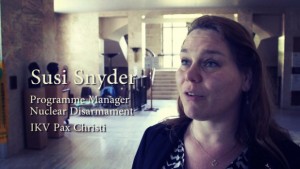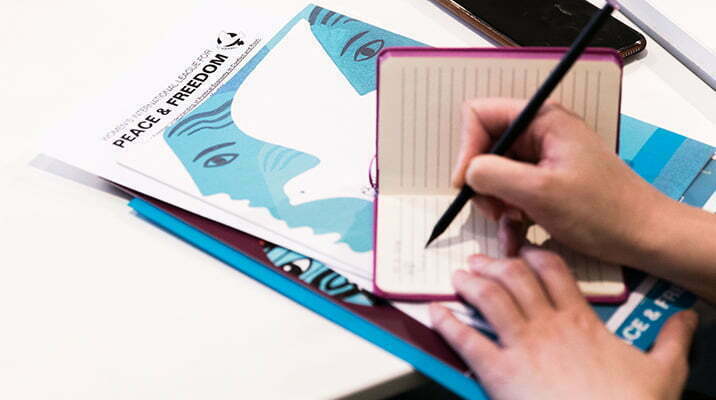
A report released today by IKV Pax Christi and ICAN reveals that several European banks invest in the build-up of the nuclear weapons industry.
The report “Don’t bank on the bomb” shows that since the beginning of 2012, financial institutions have been investing more than 300 billion USD in the nuclear industry.
The report shows that 298 private and public financial institutions from around the world invest almost 314 billion USD into 27 companies involved in the production, maintenance and modernization of nuclear weapons. The report’s “Hall of Shame” highlights the most heavily invested ones. These include State Street, Capital Group of Companies, Goldman Sachs, Morgan Stanley and Blackrock (US), Barclays Bank and the Royal Bank of Scotland (UK), BNP Paribas (France), Deutsche Bank (Germany), Mitsubishi UFJ Financial and Sumitomo Mitsui Banking (Japan), Life Insurance Corporation (India), and UBS and Credit Suisse (Switzerland).
We discussed this finding with our former Secretary-General of WILPF, Susi Snyder, currently the Nuclear Disarmament Programme Manager for IKV Pax Christi, one of the authors of the report. “When we look at the size of the investments, it is really startling to see how much money the top 10 financial institutions have provided to nuclear weapons producers” Susi explains.
Susi has been working on nuclear disarmament campaigning for a long time, and believes that divestment campaigns can be useful tools to engage members of the public. “A number of previous divestment campaigns have been crucial in bringing about change, and drawing attention to the problems that governments had yet to address” Susi Snyder argues.
Put pressure on your bank
Since almost every member of the public has a bank account or is part of a pension plan, she argues that if your bank or pension fund is investing in nuclear weapon producers then so are you. Divestment campaigns are a way to bring an abstract issue like nuclear disarmament back to personal decisions; in this case, where people put their money.
Susi Snyder believes that most people would be shocked to know that their money is funding nuclear weapon producers.
“Since banks have a large customer base, it means that campaigners have large numbers of potential campaign supporters. If enough people take action and express concern over their bank of pension fund investing in nuclear weapons, or if enough customers threaten to withdraw their funds and change their bank accounts, this can have a real impact on a bank’s decision to divest from nuclear weapons producing companies” she says.
National legislation
While individual choices by consumers are helpful, it is also possible to approach this issue on a more systematic level. Susi Snyder relates that national legislation in Switzerland, New Zealand and Australia prohibits investments in nuclear weapons. She believes that national legislation should forbid investment in any companies that produce key components for ‘an explosive device that employs nuclear fission or nuclear fusion to generate explosive force’.
“However, what we need is a treaty that outlaws nuclear weapons, and that explicitly prohibits any assistance for nuclear weapons,” Susi Snyder says.
Looking back at her previous job as the Secretary-General of WILPF (2005-2010), Susi thinks that WILPF is one of the few organisations in the world that provides an on-going analysis of the systemic issues leading to conflict, including economic analyses.
“Follow the money”
“While I was Secretary-General we had a project examining the relationship between human rights abuses and export processing zones. Very few organisations make the same global connections between the root causes of conflict.” WILPF is one of the few organisations that combines ways to move towards a more peaceful society with insight into the drivers behind the military-industrial-academic complex. “I spent almost a decade working for WILPF, during which I learned to make the connections—and to follow the money—to inspire and advocate for change.”
 As the report is being launched and picked up by media all around the world, Susi Snyder highlights that this is an opportunity for peace activists around the world to act.
As the report is being launched and picked up by media all around the world, Susi Snyder highlights that this is an opportunity for peace activists around the world to act.
Most WILPF members have a bank account or a pension plan. We can all find out if our banks or pension funds are investing in nuclear weapon producers.
Inform others
We can also inform others about the findings in this report. “WILPF member can also contact their financial institutions and demand, from a client perspective, that a policy be developed to comprehensively prohibit all investments in all activities of nuclear weapon producing companies” Susi encourages.
These actions and many others are listed on the campaign website Don’t bank on the bomb. Here you can also find the report. Download the report Don’t bank on the bomb. You can also read an executive summary with the main findings.
By Anna Andreasson, Reaching Critical Will of WILPF





